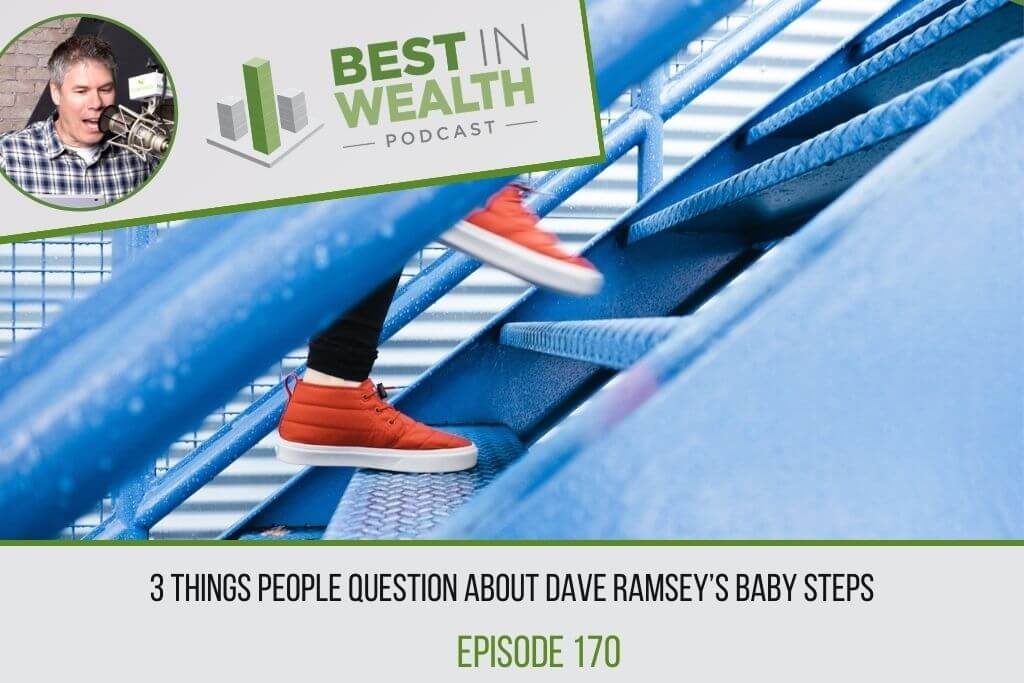3 Things People Question about Dave Ramsey’s Baby Steps, Ep #170

We can all agree that sleep is important, right? Children need 9+ hours of sleep. Adults need at least 7–8 hours of sleep. In our house, we go to bed really early, between 8:30–9. Why? If I do not get a good night’s sleep, everything else goes wrong. Many people struggle to get a good night’s sleep because they are stressed about money.
If money keeps you awake at night, there are some things you can do. Dave Ramsey’s Baby Steps are a great place to start—but many people struggle with some of the steps. So in this episode of Best in Wealth, I will talk about the objections many people have and how you can overcome them.
In this episode of Best in Wealth, I talk about 3 things that people question about Dave Ramsey’s Baby Steps. Don’t miss it! #wealth #retirement #investing #PersonalFinance #FinancialPlanning #RetirementPlanning #WealthManagement #BabySteps… Click To TweetOutline of This Episode
- [1:04] Leave Best in Wealth a Review!
- [1:30] The importance of good sleep
- [3:36] What keeps you up at night?
- [7:25] The topic of emergency funds
- [11:38] Why pay off your house early?
- [15:00] Why should I own bonds at all?
Does money keep you up at night?
Does money trouble keep you up at night? I have been there. I had a lot of debt and was constantly worried about paying bills and climbing my way out. I do not have any debt now—but I do have stress. Will I have enough for retirement? Have I saved enough for my kids to go to college? Do I have all of my estate planning documents and will in place? That is why I like Dave Ramsey. His Baby Steps can take a lot of stress out of your life.
- Step #1: Do you have $1,000 in savings?
- Step #2: Have you paid off all of your credit card debt? Would you feel less stressed then? Would you sleep better at night? Probably.
- Step #3: Do you have an emergency fund?
- Step #4: Are you saving 15% of your gross income for retirement?
- Step #5: Are you saving for your child’s college education?
- Step #6: Can you pay off your house early?
- Step #7: Are you able to build wealth and give freely?
Does all of this sound great? Would it lead to less stress in your life? Here is the problem. Many family stewards have problems with some of these baby steps.
Question #1: Why would I want my money wasting away in a bank?
I am often asked, “Why do I need an emergency fund if I can do better in the market with my money?” People say things like, “I will just use a home line of credit as my emergency fund.” They would rather invest the money in the stock market than have an emergency fund sitting in the bank making nothing. Here is the thing, it is not always about what is going to get you a better return. Sometimes it is about sleeping better at night.
A lot of people used their home equity line of credit as their emergency fund. Remember that housing bubble crisis? Banks were in deep trouble. There were no emergency funds because banks stopped offering lines of credit. The bank can take it away whenever they want. That is not security. That is why you want 3–6 months of an emergency fund in your bank account.
What’s the point of an emergency fund? Why would I want my money wasting away in a bank? I share my thoughts in this episode of Best in Wealth! #wealth #retirement #investing #PersonalFinance #FinancialPlanning #RetirementPlanning… Click To TweetQuestion #2: Why pay off your house early?
Why should you pay off your house early if your interest rate is 2–3%? It makes sense to invest that money in the market and do better. My head thinks the same way. There are a couple of ways we can look at this. If you are investing 15% of your income and savings for your kids’ college, why not pay off your house sooner rather than later? Paying off your house is a goal, why not make it happen now?
Here is an alternative: You could create a brokerage account just for paying off your home. You can put an extra house payment in it every month, knowing that you are going to use the money to pay off your house in the end. There is no guarantee in the stock market, but it is a decent alternative.
Question #3: Why should I own bonds at all?
People often ask me why they should own bonds when stocks perform better overall. Dave Ramsey does not like bonds either. Stocks perform better than bonds because they are far riskier. Bonds carry far less risk. They are in your portfolio to lower your overall risk. If you are trying to get the most return you can possibly get, but stress out every time the stock market is down, it does you no good.
William Bernstein says, “When you’ve won the game, stop playing with the money you really need.”
How much risk can you actually stomach? How old are you? How long can you handle a downturn? This helps advisors create a portfolio. I prefer to look at it differently. I want to know what your required rate of return is. If you only need to average 6% a year, why take the extra risk?
To hear the full discussion about Ramsey’s Baby Steps—and the issues people have with them—listen to the whole episode!
Why should you own bonds at all if stocks perform so much better? I share some thoughts on the matter in this episode of Best in Wealth! #wealth #retirement #investing #PersonalFinance #FinancialPlanning #RetirementPlanning #WealthManagement… Click To TweetResources Mentioned
Connect With Scott Wellens
- Schedule a discovery call with Scott
- Send a message to Scott
- Visit Fortress Planning Group
- Connect with Scott on LinkedIn
- Follow Scott on Twitter
- Fortress Planning Group on Facebook
Audio Production and Show notes by
PODCAST FAST TRACK
https://www.podcastfasttrack.com
Podcast Disclaimer:
The Best In Wealth Podcast is hosted by Scott Wellens. Scott Wellens is the principal at Fortress Planning Group. Fortress Planning Group is a registered investment advisory firm regulated by the Securities Act of Wisconsin in accordance and compliance with securities laws and regulations. Fortress Planning Group does not render or offer to render personalized investment or tax advice through the Best In Wealth Podcast. The information provided is for informational purposes only and does not constitute financial, tax, investment or legal advice.



